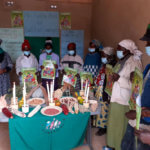The current global food systems are diverse and complex, involving everything from subsistence farming to multinational food companies. To sustain life, every human being eats and therefore we all rely on food systems, from local to global.. A food system encompasses the entire range of actors and their interlinked activities involved in the production, storing, processing, marketing, purchase, consumption and disposal of food products that originate from land, water, air or laboratory. A healthy food system provides nutritious foods free of poisons; a feminist food system provides nutritious foods while also advancing equity, fairness in income sharing and shifts in decision-making power and control of resources.
To celebrate and encourage women across the globe, including peasant and indigenous women, the United Nations has selected “Choose to Challenge” as the theme for this year’s International Women’s Day. Congruous with this, the African Women’s Collaborative for Healthy Food Systems is choosing to challenge inequitable food systems and promote healthy living through its women’s seeds project in Kenya, Senegal, Uganda, Zambia, and Zimbabwe. The project seeks to promote and increase knowledge among women farmers, their communities and organizations on the nutritional properties of local seeds saved and grown by women and the foods prepared from them. Women farmer groups are using agroecological methods to grow food from their own seeds on an increasing scale and securing commercial contracts for the purchase of their harvests to feed people in the region who are food insecure, including school children and refugees.
In implementing the women’s seeds project, the Collaborative has identified five feminist principles for building healthy food systems:
- Women have an equal place in decision-making spaces.
- Women have access to and ownership of technologies, information, and resources. This includes land, seeds, machinery, water, credit, and communications.
- Programs and policies consider the perspectives of young rural leaders and invest in new leadership, especially young female leadership.
- Actions build climate resilience Sustainable, low-emission technologies are used for every part of the food system from production to consumption. Agroecological practices are employed, valuing women’s labor and knowledge.
- An intersectional approach to addressing inequality and discrimination is used. Active conversations look at how women and youth may be marginalized or discriminated across sectors and scales (from household to international policy decision-making).
Local food systems across the globe are being undermined by increasing prominence of private standards and corporate power, unsustainable agricultural practices, lack of farmer rights, food wastes and inadequate participation of women in the decision-making spaces.
The State of Food Security and Nutrition in the World 2020 report revealed that about 690 million people were chronically hungry in the world in 2019, of whom 250 million people were hungry in Africa. Around 57% of the population in sub-Saharan African cannot afford nutritious food and this has been worsened by the impact of COVID-19. The number of chronically hungry people could rise to 840 million people by 2030 if the Sustainable Development Goals are not on track and achieved. According to the Global Food Policy Report (GFPR) in 2016, agricultural production contributes significantly to global climate change by generating one-fifth of total greenhouse gas (GHG) emissions. Insensitive and intensive use of chemical fertilizers and pesticides accounts for an estimated 10-11% of global GHG emissions.
The global giants for agribusinesses utilize poor agricultural practices to cut production costs and these unhealthy practices have resulted in about 5-10 million hectares of arable farmland become unusable annually with 0.3-1.5 million hectares becoming unproductive as a result of salinization and water logging, (Five Tops Problems of Global Food System). The International Food Policy Research Institute’s Global Food Policy Report 2020 indicates that smallholder farmers who farm less than two hectares of land produce the majority of agricultural products globally. However, they are unable to compete with corporations that dominate the market because they lack access to essential assets such as trucks and storage facilities. Women and youth farmers are particularly constrained by limitations in assets ownership and market access. The United Nations estimates that approximately 43% of farmers in developing countries are women, but they do not perform as well due to a lack of the proper inputs, services, and productive resources (UN WATER, International Decade of Action, Water for Life; 2005-2015).
Collaborative co-founder Elizabeth Mpofu said:
“The women’s seeds project has huge potential to build a food system that provides healthy food and challenges inequity. Rural women in Kenya, Uganda, Zambia, Zimbabwe and Senegal are being trained on how to identify nutritious seeds in their communities and are being encouraged to take leadership, share their experiences, learn from each other and take action together. We believe that achieving seed sovereignty is a passport to reaching food sovereignty.”
Collaborative Steering Committee member Masudio Eberu agreed:
“The project is enabling women in our communities to learn about agroecology and its role in an improved and healthier food system. During the COVID-19 pandemic, women here in Uganda have been growing seeds and supplying fresh vegetables to quarantine centers to help improve the immunity of patients. It is their contribution to curbing the spread of the disease.”
To transition to a feminist food system that is just and equitable requires the recognition of women as farmers with rights to the land they cultivate, technologies that reduce the drudgery of agricultural work, and an effective transition to agroecology with accessible and affordable inputs for farmers, especially women farmers. Roles, responsibilities, opportunities and choices should be held equally by men, women and young people.
In conclusion, the Collaborative chooses to challenge inequitable food systems by building healthy food systems using feminist principles that recognize the role women play in the value chain to provide nutritious, environmentally sound foods with a fair and visible reward.

